Stay Ahead of the Curve
Latest AI news, expert analysis, bold opinions, and key trends — delivered to your inbox.
Scientists Translate Brain Activity into Text with AI Decoder
3 min read Researchers at the University of Texas have developed an AI-based decoder that can translate brain activity into a continuous stream of text! May 02, 2023 14:14
Exciting news in neuroscience: researchers at the University of Texas have developed an AI-based decoder that can translate brain activity into a continuous stream of text! This is a huge breakthrough, as it allows for non-invasive reading of a person's thoughts for the first time. The decoder is capable of reconstructing speech with amazing accuracy while people listen to a story or even imagine one. This advancement could lead to new ways of restoring speech in patients who have suffered from a stroke or motor neurone disease.
One major hurdle the researchers overcame was the fundamental limitation of fMRI, which has an inherent time lag that makes tracking brain activity in real-time impossible. However, the use of large language models like GPT-1 (a precursor to ChatGPT) provided a way around this issue. The decoder was trained to match brain activity to meaning, rather than attempting to read out activity word by word.
The learning process was intensive, with three volunteers lying in a scanner for 16 hours each while listening to podcasts. The decoder was then used to generate text from their brain activity alone, and about half the time, the text closely matched the intended meanings of the original words.
The decoder was able to accurately describe some of the content in silent videos the participants watched while in the scanner. While there were some limitations, such as struggling with certain aspects of language like pronouns, the potential applications of this technology are exciting. It opens up a host of experimental possibilities, including reading thoughts from someone dreaming or investigating how new ideas spring up from background brain activity.
Of course, there are also concerns about how this technology could be used for nefarious purposes, but the researchers take these concerns seriously and have worked to avoid misuse. Overall, this is a significant advance in the field of neuroscience and could have far-reaching implications for patients with communication impairments and for our understanding of how the brain processes language.



















 AI Agents
AI Agents